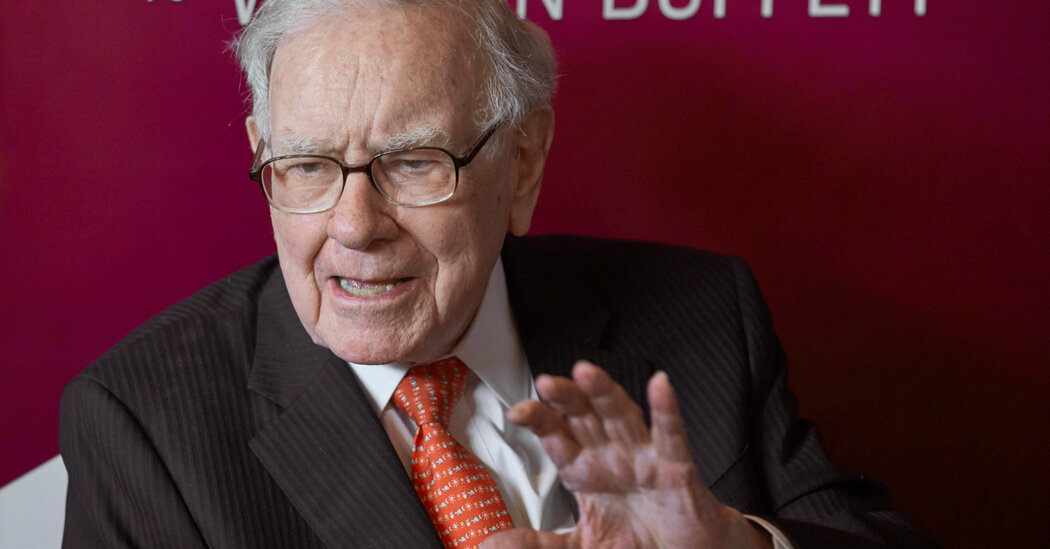In announcing the company’s $90 billion profit in 2021, Warren Buffett noted the role that Berkshire plays in the American economy.
Warren E. Buffett is eager to make one point clear about Berkshire Hathaway, the conglomerate he controls: It is a good corporate American citizen.
In announcing Berkshire’s nearly $90 billion profit for 2021 on Saturday, the billionaire stressed in his annual letter to shareholders the outsize role that the company — whose businesses run from the BNSF railroad to Geico insurance to See’s Candies — plays in the United States economy.
It is the latest effort by Mr. Buffett to wrap himself and his $713 billion company in the flag as it continues to be one of America’s most successful businesses. Last year proved to be good for Berkshire, with the company reporting $89.8 billion in earnings, more than double what it earned in 2020.
The earnings growth traces the rise in the broader economy, as the United States and other countries rebound from the depths of the pandemic.
Much of Berkshire’s results were also buoyed by its vast investment portfolio, which is financed by the enormous sums of money its insurance operations generate and is a traditional source of its financial strength. Those holdings include a 5.5 percent stake in Apple, which makes Mr. Buffett one of the iPhone maker’s top shareholders — and beneficiaries of its strong stock performance last year.
The conglomerate has outperformed the S&P 500 stock index so far this year, as its mix of diverse mix of businesses and investments have benefited from the broad economic rebound.
And the company is sitting on huge financial resources, including $144 billion of cash and equivalents that will go in part toward buying back its own shares, helping drive up its stock price, with Class A shares closing on Friday at $479,345. Over the past two years, Berkshire has spent nearly $52 billion buying back its shares. (Mr. Buffett played down the option of a longtime use of Berkshire’s cash, huge corporate acquisitions, saying that “internal opportunities” provided better returns.)
But as corporate giants face criticism on a range of issues, including how little many pay in taxes, Mr. Buffett took pains in his annual shareholder letter, traditionally scrutinized by his many fans, to emphasize how much Berkshire contributes to the national economy.
Take taxes, for example: Mr. Buffett noted that Berkshire paid $3.3 billion in federal taxes last year, as well as “substantial” amounts in state and foreign taxes. By his account, that illustrates how much the company gives back to America, calling the Treasury Department a “silent partner” in its business.
Mr. Buffett also praised the government’s role in enabling his business. “Our shareholders should acknowledge — indeed trumpet — the fact that Berkshire’s prosperity has been fostered mightily because the company has operated in America,” he wrote.
“Absent our American home, however, Berkshire would never have come close to becoming what it is today,” he wrote. “When you see the flag, say thanks.”
In his letter, Mr. Buffett also said that Berkshire owned and operated more United States-based infrastructure assets than any other American company, an aside that comes as the federal government prepares to spend $1 trillion on upgrading the country’s roads, bridges and other infrastructure.
He called the BNSF railroad, one of Berkshire’s biggest divisions, “the number one artery of American commerce” and said it carried 535 million tons of cargo over 143 million miles last year.
Saturday’s letter also sought to burnish Berkshire’s climate credentials, as Mr. Buffett faces pressure from some investors to do more to improve both its environmental record and disclosure of its performance there. Last year, the company faced a shareholder proposal, backed by some big investors, that would have required more reporting of its operations’ responses to climate change. (The measure was defeated, in part because of Mr. Buffett’s significant control of Berkshire stock.)
In discussing BNSF, Mr. Buffett argued that the railroad helped reduce the country’s carbon footprint. “If the many essential products BNSF carries were instead hauled by truck, America’s carbon emissions would soar,” he wrote.
And he argued that Berkshire Hathaway Energy, the company’s vast power division, had been outlining its goals and accomplishments in renewable energy since 2007. Reviewing its website, he said, would show “that the company has long been making climate-conscious moves that soak up all of its earnings.”
While the division had “no solar or wind generation in 2000,” he wrote, it is now “a leading force.” He added: “BHE has the management, the experience, the capital and the appetite for the huge power projects that our country needs.”
Mr. Buffett is set to resume another Berkshire tradition — an in-person annual meeting of the company’s shareholders — in late April, after having staged the event virtually since the onset of the pandemic. The annual meeting, long known as “Woodstock for Capitalists,” has usually drawn tens of thousands of Berkshire shareholders to Omaha for the chance to hear directly from Mr. Buffett for hours.


























